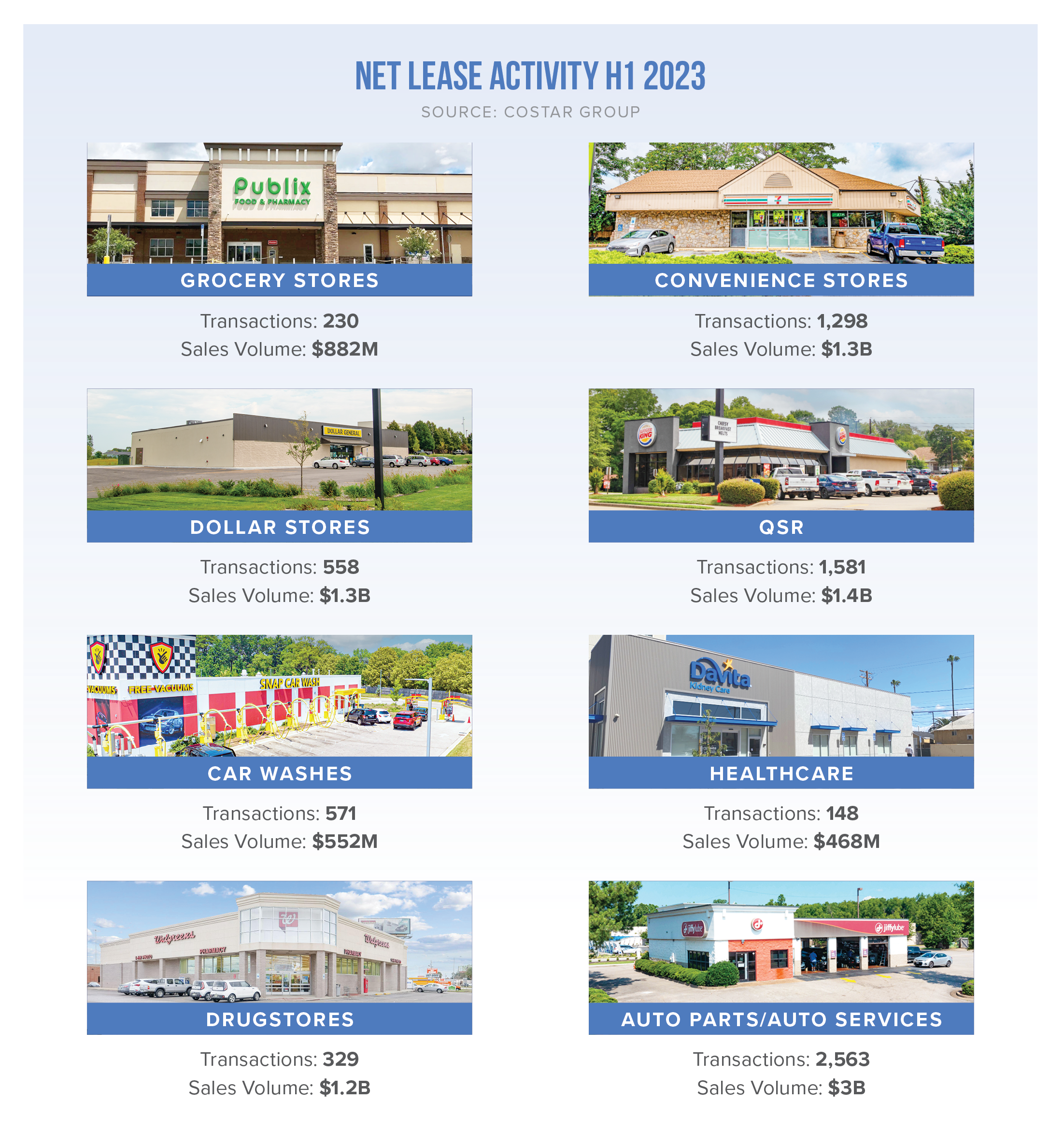Why Exchange from Apartments to NNN Assets?
Multifamily assets are an excellent investment, reigning as one of the best-performing sectors in commercial real estate. Apartments are incredibly liquid, with year-over-year sales reaching $130B in Q3 2023, according to CoStar data. However, for multifamily owners, it can be expensive, labor-intensive, challenging to navigate local policies, and an unpredictable investment to manage. Property taxes, insurance, operating expenses, maintenance costs, and management expenses are all for the landlord to rectify and maintain. Triple net lease (NNN) assets are significantly less labor-intensive and seen as low risk, passive investments. They generate a more stable income than other types of commercial real estate due to their long-term fixed leases and leave all the property responsibilities and expenses to the tenant.
Weighing the Pros & Cons
Whether a multifamily owner is nearing retirement or looking to build their portfolio, net lease properties stand out as the best alternative when transitioning out of apartment assets. However, there are benefits and drawbacks to consider.
The Benefits
1. Minimal to No Management Responsibility
The most significant advantage triple net lease properties have is requiring minimal, and in most cases zero, management responsibilities. Triple net leases are structured so that the tenant is responsible for all maintenance, operating costs, real estate taxes, insurance, repairs, etc. Therefore, net lease owners can collect steady rental income without the added stress.
2. Increased Cash Flow
Triple net lease assets can be corporate-backed, offering better credit, a greater ability to conserve capital, and better predictability of income cash flows. With all tax expenses, insurance, and property maintenance deferred to the tenant, multifamily owners who trade into NNN properties can immediately benefit from the decreased costs. Lastly, rental increases are worked into the lease structure, unlike apartment leases that keep one rate for the duration of the lease.
3. Fewer Tenants
Triple net lease properties deal with one tenant through the duration of the lease, as opposed to hundreds of tenants in multifamily buildings that transition frequently. Retail owners experience less tenant turnover as triple net leases are long-term contractual agreements that can last up to 25 years. Retail landlords won’t have to spend any time or money locating new tenants every year.
4. Diversified Portfolio
By converting to a NNN asset, there are opportunities to invest in various tenants and locations, thus creating a diversified and robust portfolio. With varying tenants and asset types, a diversified portfolio can be a great hedge against unpredictable situations, such as economic downturns or global pandemics.
The Considerations
1. Vacancy Risks
Though NNN leases are long-term, the tenant can vacate at the end of the term, resulting in losses while the landlord tries to backfill the space. It can be challenging to find a replacement tenant as, in most cases, the building was specifically built towards the previous tenant’s use.
2. Less Appreciation
There is the opportunity to negotiate a percentage of the tenant’s business sales and the base rent increases to increase cash flow further. A fixed rental schedule based on CPI increase will also benefit from staying on par with inflation.
3. Tenant Performance
Though retail had some shining stars amid the global pandemic and inflationary periods, not all performed the same. There are risks involved in investing in a tenant that might not be considered an essential business. As it stands today, virtually every retail tenant is paying rent again, with most assets back to pre-pandemic levels.
The Retail Tenants to Invest In
When looking back at the pandemic’s peak, some retail tenants suffered, and others thrived. These asset types proved their resiliency during an unprecedented time, showing their strong performance during economic hardships. Multifamily owners looking for the safest net lease assets should consider the following asset classes:
Where to Invest
It’s no secret that location plays a prominent role in the success of a business. Multifamily owners can take advantage of trading into an income tax-free state as there is no reason to be on-site or within the same state as their retail asset. Typically, net lease tenants are strategically located in areas with solid demographics and high visibility. However, it is worth researching where retail tenants are moving as they often target rapid growth markets with substantial consumer spending.
The Sunbelt
The most recently targeted area is the Sunbelt region, as migration trends, employment opportunities, and business-friendly tax environments appeal to net lease tenants. Owners in the Sunbelt can expect favorable appreciation if these fundamentals continue.
Understanding Corporate Guaranties
Triple net buyers have the opportunity to invest in corporate-backed triple net lease properties or franchisee lease properties. When signing a lease, it’s important to consider either a corporate guaranty or a franchise guaranty. Oftentimes, big retailers have franchisees operating the business rather than the corporation.
Corporate Guaranty
A corporate guaranty involves the corporation to financially back the obligations of the tenant with their corporation’s financial holdings. The bigger the corporation, the stronger the lease is and the less chance of tenant default. Owners will feel safe with a corporate guaranty as they will receive lease security from a private company or a tenant with an investment-grade credit rating. For example, Starbucks has BBB+ credit rating, with an extremely low chance of default.
Franchisee Guaranty
A franchisee guaranty involves the franchisee backing the rent payments and obligations of the tenant. It’s important to note that franchisees range in size from one-unit operators to 1,000+ units, so it’s imperative to understand the specific franchisee in the NNN property and their worth. The franchisee’s net worth could determine the strength of the guaranty and chances of default.
1031 Exchange
Often used as a tax deferral strategy by real estate investors, 1031 Exchanges involve a property owner selling one or more of their assets in exchange for one of more like-kind (investment real estate) properties of equal or greater value. Astute investors capitalize on the various benefits that 1031 Exchanges offer, including resetting the depreciation timeframe of an asset, consolidating or separating assets, and growing equity and holdings. Moreover, certain types of retail tenants qualify for accelerated depreciation, with some boasting a 70 percent bonus depreciation over the purchase price in the first year. Multifamily owners looking to opt-out of their time-intensive property should seriously consider this strategy.
While multifamily is a top-performing asset class, the ongoing management and unexpected costs can create stress and deduct from any additional investment capital. Multifamily owners looking to transition from high-maintenance to low-maintenance NNN properties to build wealth should consider a 1031 Exchange. Speaking with a specialized agent will ensure a complication-free transition to the right NNN property.










